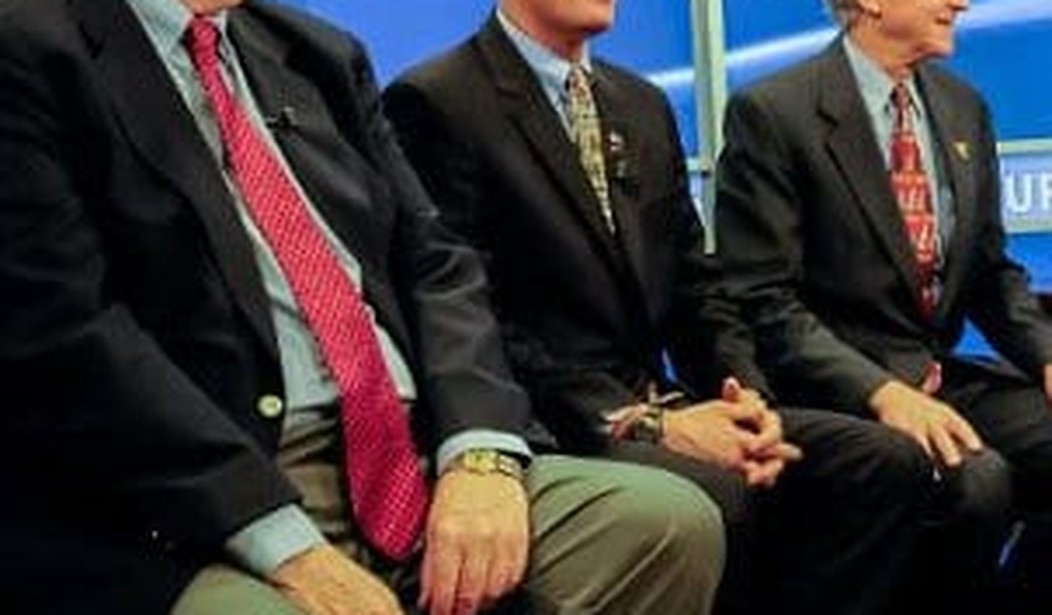The Republican hopefuls for unseating Jeanne Shaheen (D-N.H.) met in a debate on Aug. 27, their last before they square off in the Sept. 9 primary to determine who will face the incumbent in the general election.
The debate aired on WGIR-AM and featured former Massachusetts Sen. Scott Brown, former New Hampshire state Sen. Jim Rubens and former New Hampshire Sen. Bob Smith.
In his opening remarks, Rubens reminded voters that while a state senator he championed the bill allowing all-day voting on town and school district budgets in the state and “led tough fights” to block corporate welfare and open up competition in the electricity market.
“During my campaign…I’ve offered bold, detailed, thoughtful solutions to deal with our nation’s crushing debt, our declining standard of living, our security threats and the corrupt political money system that is the root cause of Washington dysfunction and gridlock,” he said. “What sets me apart, and what voters want, are solutions. My record is full of solutions that bring a difference to people’s lives.”
Brown, in his opening statement, said he was “deeply concerned” about America’s foreign, immigration and energy policies under the leadership of President Obama and said the national debt was “incredible.”
“We have so many things happening right now that you almost think that the world is on fire,” he said. “We have a senator, right now, who votes 99 percent of the time with the president in those failed policies.”
Smith, too, said that the nation’s debt and foreign policy are among the key issues dragging down America, adding that the increased spying programs by the National Security Agency and the Veterans Affairs scandal have eroded people’s trust in the federal government.
“The question really boils down to ‘who’s tough enough?’” Smith said. “Who’s experienced enough to take on Jeanne Shaheen? It’s not about the three of us – it’s bigger than that. It’s about the country and our country is in trouble.”
The first question posed to the candidates was about climate change. Rubens, a former spokesman and consultant for the Union of Concerned Scientists, reiterated his position that climate change is man-made. He proposes eliminating energy subsidies, saying that the subsidies have “retarded the pace of technology development.”
“[Subsides] have frozen technology one or two generations behind where it should be,” Rubens said. “I believe that we can more rapidly get to our goal [of] abundant, clean and lower priced energy.”
Removing subsidies, he said, is the best way to “unleash the free market” allowing technologies to “fight it out.”
Brown said that the origin of climate change is both a man-made and natural one and that an “all of the above” approach — including nuclear, wind, solar, hydro, geothermal and natural gas — is needed to diminish America’s reliance on foreign oil.
Smith said his opponents’ positions on climate change are “a perfect example” of why neither is the best candidate to face Shaheen in the general election.
“I don’t believe at all that climate change is man-made. There is no evidence to support that,” Smith said. “What we need to do is produce more energy.”
He said that moving away from foreign energy would not only help America become energy independent but would also create much-needed jobs for skilled workers.
The panel was also asked about their opinion on the Keystone XL pipeline; Smith and Brown quickly said they were for it. Rubens said he “was OK with it” but it “was more $100 a barrel oil” and “not the solution to our energy problems.”
Brown was confronted about his role as independent director with the Massachusetts-based papermaker and recycler Kadant, which is accused of moving a large number of jobs overseas.
He said he had no intention to leave his position on the board, despite the outsourcing reports, and used the opportunity to attack an agreement Shaheen made while governor of New Hampshire. He accused her of outsourcing jobs at a call center for the program to India as part of her administration’s deal with Citibank in the late 1990s.
“What Kadant did five years ago before I was even on the board – I would suggest that anyone who is interested should refer those questions to the board,” Brown said.
Smith said American companies were actively moving and outsourcing because of the high tax rate in the Unites States. He said cutting taxes and regulations would bring those companies back, thus creating jobs. Smith also proposed “tax amnesty” for companies that would be willing to move their assets from the offshore accounts back into the U.S.
Rubens outlined his six-point plan to bring jobs back to the U.S., which includes fixing the tax code – making it “fairer, flatter and simpler” – repatriating the income from foreign companies who do business in the U.S., repealing Dodd-Frank, reducing healthcare and energy costs, closing the borders and “defending our currency.”
As Massachusetts senator, Brown voted for Dodd-Frank, which Smith called a “regulatory nightmare.” Smith also assailed Brown for other votes he made while in the Senate that, he says, do not fit with Republican ideology.
“He has voted for gun control and he’s voted for abortion,” Smith said. “So if you’re a Republican and you want to support the platform, how do you support a candidate who has those views?”
Smith pointed to Brown’s relationship with former New York Mayor Michael Bloomberg, his opposition to reciprocity laws and his support for an assault weapons ban as examples of him being soft on Second Amendment issues. Rubens said that Brown had earned a C rating from the National Rifle Association on firearms-related issues, while Rubens and Brown both earned A-plus ratings.
“I’ve proposed… giving people in schools the option… of having people to protect [them],” Rubens said. “I’ve proposed beefing up our mental healthcare system.”
Rubens says that the polls show that more than half of Republican voters are not convinced that Brown should be the candidate, despite the push by the national party that Brown is the best candidate to beat Shaheen.
In his defense, Brown said he has earned every vote by reaching out to constituents by going door-to-door and hosting townhall meetings throughout the state.
“The fact that I have earned the endorsements from people who care about the direction of our country and our state, I am proud to accept the endorsements,” he said. “I’ve never voted for abortion, I am a pro-choice, independent leader. I’m against partial-birth abortion; I’m against federal funding for abortions. I believe very strongly that parents should play a role in decisions involving their children.”
Each candidate promised to make an attempt to either repeal-replace or altogether repeal the Affordable Care Act, as they have all made clear on the campaign trail. However, Smith said that Shaheen will be able to use Brown’s support for “Romneycare” as ammunition against him if he is her opponent in the election.
Rubens and Brown promised that they would support whoever won the primary if their bids were unsuccessful. Smith, however, said that he would make that decision after the primary process is complete.









Join the conversation as a VIP Member